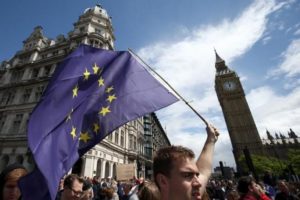Brexit I to Brexit II? The UK out of UNSC ? It depends on who you ask

People hold banners during a ‘March for Europe’ demonstration against Britain’s decision to leave the European Union, in Parliament Square, in central London Reuters/Neil Hall
In Bratislava on Friday (September 16), there were, as The Economist said, “forced smiles” all around. The leaders of 27 European Union countries—all bar Britain—were meeting in the Slovakian capital to show that life goes on, Brexit or not. Interestingly, some of the great and the good were fairly forthcoming about what Brexit might mean. It would hurt the EU to lose Britain, they acknowledged. After all, Britain is in the G7 and has a seat on the UN Security Council (UNSC). But why, they asked, is it in the G7? Because it has access to the European single market.
Brexiteers may bridle. They should take comfort that the Euro-worthies didn’t say more about the UNSC . Many might ask why a small island should have a permanent seat?
I’ve written about this before and can report that most of the interest in the idea has come from people without any sentimental interest in the United Kingdom.
That is entirely unsurprising. Why would anyone with any links to (or affection for) Britain be excited by the prospect of a great humbling? A post-Brexit removal of Britain from permanent membership of the UN Security Council would be the greatest humbling of all. UNSC veto-wielding membership is one of the real reasons the UK is still considered a world power even though it’s small and hasn’t had an empire for the better part of a century.
But any attempt to removing the UK from the UNSC would not be about the UK per se. It would be about UNSC reform. About making sure that those on the P5 are entitled to be there – ie, they should be big enough in some way. They should have clout, make a substantial contribution to the UN, display the capacity and willingness to act in defense of international security and have institutional wherewithal to participate in a demanding UNSC agenda.
The worry is that a United Kingdom sans Scotland would lose on all these counts. For if Scotland holds a second referendum on independence and this time, decisively votes to leave the UK, the country will shrink. Physically and psychologically. It will become poorer and weaker and less able to concentrate on issues that go beyond immediate crisis-management. British diplomacy may become less able to take a worldview, for a globalist mindset takes money, concentration and the luxury of being able to devote attention to matters beyond one’s own borders.
How surprising would it then be for the UK’s misfortune to be turned into an opportunity for others? Not least the various informal groups who’ve been campaigning for years to re-structure the powerful veto-wielding body. India, Brazil, Germany, Japan, otherwise known as the G4. The African Union. The Arab League.
Pure coincidence, of course, but it was on June 23, the UK’s fateful Europe-referendum day that India’s permanent representative to the UN Syed Akbaruddin, issued a statement on behalf of the G4. He slammed it as “outdated”.
Anyway, the G4 wants to expand the Security Council to 25 members – six more to be given permanent membership; four to be non-permanent members. The six new permanent members would ensure an equal regional spread – two seats for Africa, two for Asia, one for Latin America and the Caribbean, and one for western Europe and other states.
The African Union (AU), meanwhile, has something that’s informally dubbed the Ezulwini Consensus, after the valley in central Swaziland where the agreement was arrived at in 2005. Like the G4 proposal, the AU wants at least two permanent seats on the P5 – with veto power. It also wants to be able to decide on a further five non-permanent seats. It points out the paradox of seeking veto powers for new UNSC members even though it is opposed to the veto in principle. If one UNSC members has the right to veto, everyone should, it argues.
Mostly, of course, it’s hard to argue against putting countries like Germany (big contributor to the UN budget, big economy, clout in Europe); India (demographic giant, fast-growing economy) and a couple each African and Arab states on a body that claims to represent the planet.
There are other permutations and combinations that have been proposed over time, but most fall at the most crucial point – the P5’s reluctance to write down their singular power in world affairs. Mostly, they want to do this by denying the veto to any new permanent member of the Security Council. But that unyielding stance may be forced to change if Britain’s place in the UNSC starts to be seriously questioned. It would then become the loosening of the first brick in the blank wall of UNSC status quoism.

